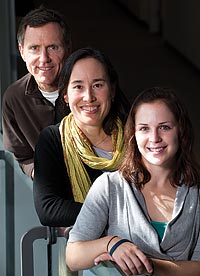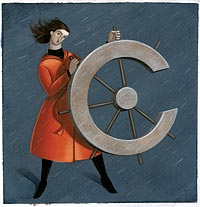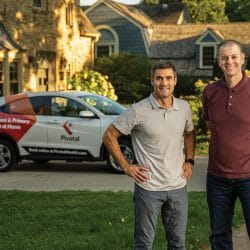The Wayfinders
A one-of-a-kind UW program helps patients who are overwhelmed by serious medical diagnoses to navigate the confusing array of choices and next steps — from interpreting insurance coverage to getting a second opinion to finding clinical trials.
Laura Mueller’s cancer was back, and there was no recommended treatment. She didn’t know what to do.
After being diagnosed in 2001 with a rare and aggressive cancer called leiomyosarcoma, she underwent chemotherapy, surgery, and eventually, a cutting-edge procedure that essentially cooks tumors to try to remove them from her liver and lungs. But in 2007, a CT scan showed the fight was not over for the sixty-one-year-old retired elementary school teacher.
“I felt like I was in the ocean as a non-swimmer,” Mueller says. “I just felt so overwhelmed with the enormous responsibility and journey.”
Her only options were to get a second opinion and investigate clinical trials, an enormously complicated pursuit. Fred Lee, the radiologist who has treated Mueller several times, suggested she do what he does when he wants to know about clinical trials: call his sister.
Like her brother, Suzanne Lee is a doctor, but she uses her medical training to help clients of UW-Madison’s Center for Patient Partnerships, which during the past decade has helped nearly two thousand clients negotiate health insurance and employment issues, find second opinions and locate clinical trials, and move past the paralysis of a frightening diagnosis. The center also serves as an unparalleled clinical learning experience for students studying law, medicine, social work, pharmacy, public health, and nursing, who work as patient advocates.
“My mom had been doing really well for a year and a half or two years, so to find out that it was back and it was bad, and there was no recommended course of treatment … you’re just dealing with all that emotional stuff,” says Mueller’s daughter, Jessica Gilkison JD’99. “There’s nobody who can tell you what to do — and that’s not what the center does either. But to have somebody who has the time to walk you through all the steps was invaluable for us.”
The center worked with Gilkison to see a specialist at Dana-Farber Cancer Institute in Boston, who discussed treatment options. Later, the center helped Mueller get into a UW-based clinical trial studying the effects of using two FDA-approved drugs together to combat her disease.
“They provided a compass for us to at least have a sense of direction,” says Mueller, who when asked how she is doing today, responds with a bright smile and says, “I’m here.”
‘It’s One Heart at a Time’
Fred Lee’s patients don’t usually demand to meet him. But Meg Gaines was not a typical patient.

Teamwork is a cornerstone of the Center for Patient Partnerships. Director Meg Gaines has built a staff that includes patient advocates Pete Daly (at top), Suzanne Lee (center), and Clare O’Connor. Photo: Jeff Miller
In radiology, doctors can often remain anonymous behind closed doors. Gaines JD’83, LLM’93 didn’t let that stop her. She checked up on Lee, asking around to make sure he was good enough to read her scans, and when they spoke face-to-face about her results, her knowledge about medicine and her illness blew him away. Gaines had ovarian cancer, two very young children, and was, in a word, tenacious.
Lee remembers thinking to himself at the time, “Wow. If every patient did this … a lot fewer mistakes would happen; patients would understand better the course of their disease, why things happened; and it wouldn’t be such a black-box mystery to them.”
When Gaines was sick fifteen years ago, some of her friends went through her medical bills to help sort out payment. Others researched the latest developments in treatments. One made a quilt stitched with shapes of the handprints of Gaines’s loved ones to keep her warm.
The Center for Patient Partnerships, which Gaines founded in 2001, operates on the same principle: people facing life-threatening or serious chronic diseases can’t go it alone, but that doesn’t mean they should turn over decision-making to doctors. One of the hardest aspects, says Gaines, who serves as director, is getting patients to understand that “it’s still their life. It’s important for them to make choices that reflect their values in a situation like this.”
The center, which is affiliated with the schools of law, medicine and public health, nursing, and pharmacy, also makes sure that student advocates don’t cross the line in their eagerness to help and end up disempowering their clients. Advocates don’t give orders; patients are regarded as the captains of their health care team and make their own decisions.
Gaines was influenced both by her own journey through the complex health care system as a cancer patient and by her previous work in the law school with a program that provides legal assistance to prison inmates.
“It’s easy to take people in a situation, whatever the situation is, and characterize them or stereotype them,” she says. “The lesson is, that it’s one heart at a time, and if you think you can go faster than that or more efficiently than that, you can’t.”
Operating primarily on donations, the center charges clients nothing for the help it provides. “We struggle to stay afloat, and we rely on the generosity of people who believe in what we do,” Gaines says.
‘I Need to Reach Out … We Need Help’
Clients often come to the center soon after learning they have cancer or some other life-threatening illness. But getting that information isn’t always as simple as it seems.
“One of the things that surprises people is how hard it is to get a diagnosis,” Gaines says. “People think: I have this, there’s a test, we know it’s yes or no.”
Getting a second opinion is important, she adds — even if the first opinion is good news. “If somebody gives you good news and it turns out not to be, you’ve lost a lot of time,” Gaines says. “If somebody gives you bad news and it turns out not to be, you certainly don’t want to have treatment unnecessarily.”
At any given time, the center is helping thirty to forty clients with longer-term advocacy and about ten more with what is known as critical advocacy — cases that can usually be resolved with just a handful of phone calls. Sometimes the client is the patient; in other cases, the point of contact is a family member. Despite being housed in the law school, the center does not litigate. Instead, it uses its status as a well-informed third party to ask questions and push for the answers patients might not be able to get on their own.
“A lot of times, there isn’t a great answer to the questions we get called with, and we can fight the fight, we can go up against insurance,” says Emma Hynes ’08, MPHx’10, MPAx’11, who began working as a student advocate this year after her father was diagnosed with stage IV colon cancer. “But a lot of times, the best service we provide is just helping the client to feel like they exhausted all possibilities.”
One of Hynes’s clients, Michelle Minder-Massey, is thirty-eight and suffers from lupus and mixed-connective tissue disease that cause severe, chronic pain. “If you could imagine somebody laying a clothes iron and pressing it on the underside of your skin, that’s how bad it will get,” Minder-Massey says.
She relies on her fifteen-year-old daughter to help her bathe and wash her hair. There are good days when Minder-Massey is able to shower on her own, but her pain confines her to bed 90 percent of the time, with a fish tank nearby and her laptop computer within reach.
“I went from being superwoman, conquering everything in the world … to sometimes I can’t eat or I need help to go to the bathroom,” says Minder-Massey, a former newspaper editor who contacted the center earlier this year for help obtaining Social Security disability insurance.
Hynes says that for most people facing a serious illness and its impact on loved ones, there is always a breaking point, “when they finally say, ‘I need to reach out … we need help, we can’t do this alone, navigating the system is too much.’ ”
Minder-Massey’s condition makes it difficult for her to put pen to paper, so Hynes filled out the fourteen-page disability application form on her behalf and developed an advocacy list, with priorities — including home health care services and family counseling — to deal with the stress of her illness.
“They make me feel like things are going to be okay,” Minder-Massey says. “It is hard emotionally to lose your independence, no matter what age you are … to have somebody like Emma — it makes a world of difference.”
The work requires persistence. Hynes, who is also doing research at the center for her dual master’s degree, recalls days of phone calls and talking to as many as fifteen people just to get a copy of a client’s policy from an insurance company.
Yet, Gaines says, often the center’s work can be accomplished in just one conversation, when a patient calls the center to say, “Am I doing okay? I’m really scared. Am I doing what I should be doing? Can you think of anything I’m not doing?” Whether it takes one call or many, advocates help patients stay the course.
‘A Sense of Hope and Direction’
It’s easy enough to forget what you want to ask your doctor during a routine visit — for too many of us, the flimsy gown goes on and any organized thoughts evaporate from our brains. Adding a serious illness into the mix makes it even harder to focus.
“It’s a pretty well-known fact that when patients come to see a cancer doctor, that it’s a complicated conversation and they only retain about half or less of what you talk to them about,” says Tom McFarland, a UW physician certified in hematology, oncology, and internal medicine who has referred patients to the center for help and consulted on some of its other cases. “If you go in and you don’t know what to ask, there may be some things that you really need to know that you don’t even think about.”
That’s where the center’s advocates can make a difference, by either meeting with clients before or after appointments, or even coming along to talk with doctors.
“The word cancer is so overwhelming that it takes over your life,” says Lacinda Smith, who contacted the center for help after her mother, Marilyn Isenhart, was diagnosed in March with stage IV melanoma, skin cancer that had spread to other parts of her body. Their student advocate, Clare O’Connor MPHx’11, researched clinical trials when chemotherapy failed to stop the cancer from spreading. O’Connor, who has a bachelor’s degree in biology, uses her science background to walk Isenhart and Smith through the trials and the medications involved, something busy physicians don’t always have time to do.
“I’m ready to go for it,” says Isenhart, a seventy-one-year-old retiree with fourteen grandchildren and one great-grandchild, who was accepted into a clinical trial in Michigan. “I want to live, so I’m going to do whatever I have to do. So, sky’s the limit.”
Aiding patients with finding trials is another of the center’s invaluable services. “As a physician, I’d love to be able to do all of the extra legwork for looking for the unique clinical trials that we don’t have access to when a patient’s exhausted other options,” McFarland says. “There just aren’t enough hours in the day.”
O’Connor, like other patient advocates, does more than research. Along with Pete Daly, her supervisor at the center and a melanoma survivor, she has served as an essential piece of the Isenharts’ support system. It’s clear her diligence and compassion have meant the world to this family, too.
“When we meet with Pete and Clare, we come away with a sense of hope and direction — something that we don’t always get from the medical doctors. And they’re great doctors, but we sometimes come out of there feeling overwhelmed and almost a sense of doom,” Smith says.
The experience of working with Isenhart and other clients has convinced O’Connor to apply for medical school, with the goal of becoming a primary care doctor. Smith wrote her a glowing recommendation letter. O’Connor, who was inspired to work at the center after hearing Gaines speak during a class, says being an advocate has made her more aware of the non-medical hassles that patients facing serious diagnoses go through at a time when they are already facing a great deal of stress.
“This has been the most useful educational experience I’ve had — looking at the complete picture of what happens to a family and an individual when they are diagnosed with a serious disease. [It’s what] you don’t see if you focus on one part of it,” she says.
‘Cancer Doesn’t Grow on Weekends’
Spending any time at the center means coming into contact with walking-and-talking stories of hope and survival.
Daly became a client in 2002, after a diagnosis of stage III melanoma. A clinical trial at the National Institutes of Health helped save his life. Isenhart says Daly taught her to “get out and enjoy life, and do things when you don’t feel like it. He said, ‘Enjoy your weekends, because cancer doesn’t grow on weekends,’ and then he said, ‘Deal with cancer for four hours [a day] and then forget it. Live!’ And I’ve done that.”
In fact, during her first meeting with Daly and O’Connor, the advocates helped develop next steps for Isenhart and her family to move forward not only with a medical plan, but a life plan, too. “That’s our focus at the center, not only the medical side, but the healing side and the living side,” O’Connor says.
Like Daly, other members of the center’s team have traveled the path from patient to advocate.
Jessica Gilkison, Mueller’s daughter and an attorney who had worked for a disability rights organization, couldn’t resist the chance to join the center’s team when a position supervising student advocates became available. She says that her experience as a client has given her “that inside perspective on how your life can be turned upside down by health issues … on what it’s like to be sitting in the waiting room when you’re waiting for CAT scan results.”
Before he became a client, and later a staff advocate, Marc, who did not want his full name used, learned about the center during his second year of law school when he took Gaines’s course on consumer issues in health care. His homework included reviewing his own insurance policy — a three-hundred-page document — and diagramming what it did and did not cover. About a year later, Marc was diagnosed with testicular cancer. Because of the class assignment he had completed, he knew that his policy would cover the cost of his surgery and chemotherapy.
“I could understand. I could pull out this grid,” he says, adding, “Life is kind of crazy.”
Now cancer free, Marc began working at the center after graduating from law school in May, doing advocacy work and launching a new Web site for patients called “Pathways to Empowerment.” (See sidebar.) The center helped Marc research treatment options after his diagnosis, and as an advocate, he offers fellow student advocates a firsthand perspective on various situations, such as what it’s like to finish treatment.
“Just saying to somebody, ‘Go and celebrate’ — people might not be feeling like celebrating,” he says. “They might actually be feeling kind of abandoned, because [they’re] used to getting so much from everybody, and then all of a sudden, everybody’s gone.”
But the patient whose story still fuels the center is Gaines, whom doctors gave a 5 percent chance of surviving cancer.
“What I think I learned is, you’re either 100 percent alive or 100 percent dead at any given moment,” Gaines says. “What statistics tell you is whether you’re in a great big fight, a medium-sized fight, or a little fight. And people win and lose all three, and so it just tells you what your fighting mindset is.
“It tells you what level of risk you’ll take in treatment. It informs things. But I don’t think it’s very helpful on the ultimate question: will I stay or will I go?”
Jenny Price ’96 is a writer for On Wisconsin.
Published in the Winter 2009 issue



Comments
Anonymous May 1, 2010
Thank you for this info. My 32 yr. old son just came down with a serious form of leukemia. He is given 30 % chance of survival.
We are all reeling from this news, & need help.
I am looking for studies, but can’t find anything.
He is at UW. Madison, so will ask for more on this group.
Thanks